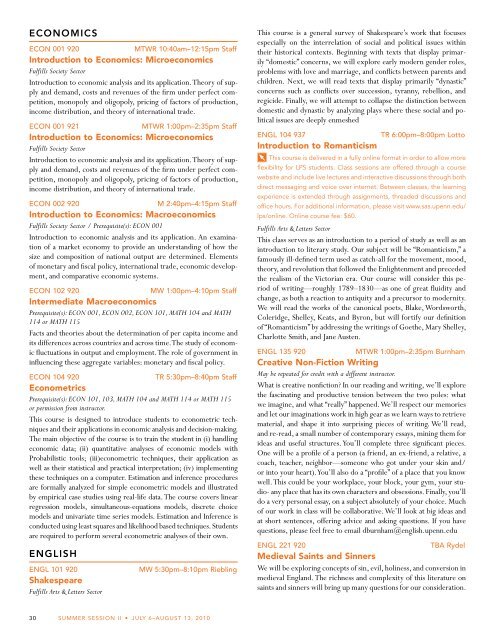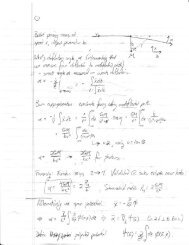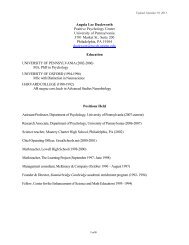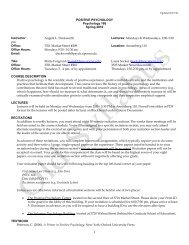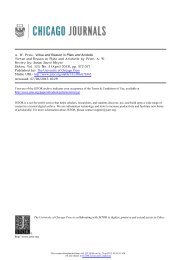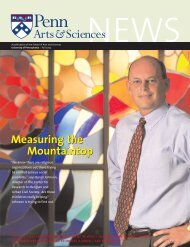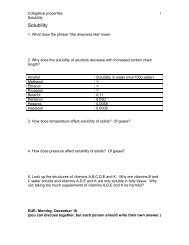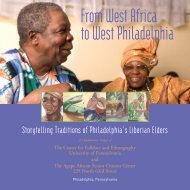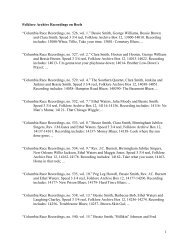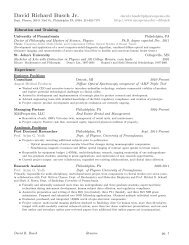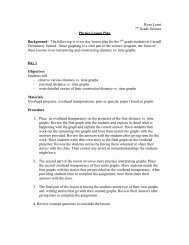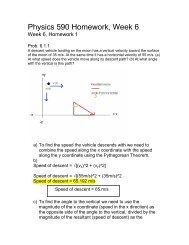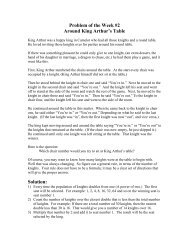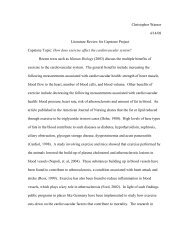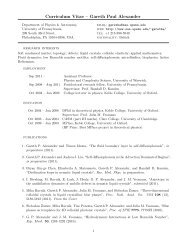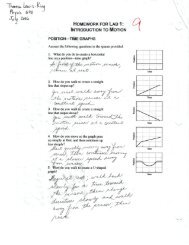PENN SUMMER - University of Pennsylvania
PENN SUMMER - University of Pennsylvania
PENN SUMMER - University of Pennsylvania
Create successful ePaper yourself
Turn your PDF publications into a flip-book with our unique Google optimized e-Paper software.
eConoMiCS<br />
eCon 001 920 MTWr 10:40am–12:15pm staff<br />
Introduction to Economics: Microeconomics<br />
Fulfills Society Sector<br />
Introduction to economic analysis and its application. Theory <strong>of</strong> supply<br />
and demand, costs and revenues <strong>of</strong> the firm under perfect competition,<br />
monopoly and oligopoly, pricing <strong>of</strong> factors <strong>of</strong> production,<br />
income distribution, and theory <strong>of</strong> international trade.<br />
eCon 001 921 MTWr 1:00pm–2:35pm staff<br />
Introduction to Economics: Microeconomics<br />
Fulfills Society Sector<br />
Introduction to economic analysis and its application. Theory <strong>of</strong> supply<br />
and demand, costs and revenues <strong>of</strong> the firm under perfect competition,<br />
monopoly and oligopoly, pricing <strong>of</strong> factors <strong>of</strong> production,<br />
income distribution, and theory <strong>of</strong> international trade.<br />
eCon 002 920 M 2:40pm–4:15pm staff<br />
Introduction to Economics: Macroeconomics<br />
Fulfills Society Sector / Prerequisite(s): ECON 001<br />
Introduction to economic analysis and its application. An examination<br />
<strong>of</strong> a market economy to provide an understanding <strong>of</strong> how the<br />
size and composition <strong>of</strong> national output are determined. Elements<br />
<strong>of</strong> monetary and fiscal policy, international trade, economic development,<br />
and comparative economic systems.<br />
eCon 102 920 MW 1:00pm–4:10pm staff<br />
Intermediate Macroeconomics<br />
Prerequisite(s): ECON 001, ECON 002, ECON 101, MATH 104 and MATH<br />
114 or MATH 115<br />
Facts and theories about the determination <strong>of</strong> per capita income and<br />
its differences across countries and across time. The study <strong>of</strong> economic<br />
fluctuations in output and employment. The role <strong>of</strong> government in<br />
influencing these aggregate variables: monetary and fiscal policy.<br />
eCon 104 920 Tr 5:30pm–8:40pm staff<br />
Econometrics<br />
Prerequisite(s): ECON 101, 103, MATH 104 and MATH 114 or MATH 115<br />
or permission from instructor.<br />
This course is designed to introduce students to econometric techniques<br />
and their applications in economic analysis and decision-making.<br />
The main objective <strong>of</strong> the course is to train the student in (i) handling<br />
economic data; (ii) quantitative analyses <strong>of</strong> economic models with<br />
Probabilistic tools; (iii)econometric techniques, their application as<br />
well as their statistical and practical interpretation; (iv) implementing<br />
these techniques on a computer. Estimation and inference procedures<br />
are formally analyzed for simple econometric models and illustrated<br />
by empirical case studies using real-life data. The course covers linear<br />
regression models, simultaneous-equations models, discrete choice<br />
models and univariate time series models. Estimation and Inference is<br />
conducted using least squares and likelihood based techniques. Students<br />
are required to perform several econometric analyses <strong>of</strong> their own.<br />
enGliSh<br />
engl 101 920 MW 5:30pm–8:10pm riebling<br />
Shakespeare<br />
Fulfills Arts & Letters Sector<br />
30 <strong>SUMMER</strong> SESSIOn II • JULY 6–AUgUST 13, 2010<br />
This course is a general survey <strong>of</strong> Shakespeare’s work that focuses<br />
especially on the interrelation <strong>of</strong> social and political issues within<br />
their historical contexts. Beginning with texts that display primarily<br />
“domestic” concerns, we will explore early modern gender roles,<br />
problems with love and marriage, and conflicts between parents and<br />
children. Next, we will read texts that display primarily “dynastic”<br />
concerns such as conflicts over succession, tyranny, rebellion, and<br />
regicide. Finally, we will attempt to collapse the distinction between<br />
domestic and dynastic by analyzing plays where these social and political<br />
issues are deeply enmeshed<br />
engl 104 937 Tr 6:00pm–8:00pm lotto<br />
Introduction to Romanticism<br />
This course is delivered in a fully online format in order to allow more<br />
flexibility for LPS students. Class sessions are <strong>of</strong>fered through a course<br />
website and include live lectures and interactive discussions through both<br />
direct messaging and voice over internet. Between classes, the learning<br />
experience is extended through assignments, threaded discussions and<br />
<strong>of</strong>fice hours. For additional information, please visit www.sas.upenn.edu/<br />
lps/online. Online course fee: $60.<br />
Fulfills Arts & Letters Sector<br />
This class serves as an introduction to a period <strong>of</strong> study as well as an<br />
introduction to literary study. Our subject will be “Romanticism,” a<br />
famously ill-defined term used as catch-all for the movement, mood,<br />
theory, and revolution that followed the Enlightenment and preceded<br />
the realism <strong>of</strong> the Victorian era. Our course will consider this period<br />
<strong>of</strong> writing—roughly 1789–1830—as one <strong>of</strong> great fluidity and<br />
change, as both a reaction to antiquity and a precursor to modernity.<br />
We will read the works <strong>of</strong> the canonical poets, Blake, Wordsworth,<br />
Coleridge, Shelley, Keats, and Byron, but will fortify our definition<br />
<strong>of</strong> “Romanticism” by addressing the writings <strong>of</strong> Goethe, Mary Shelley,<br />
Charlotte Smith, and Jane Austen.<br />
engl 135 920 MTWr 1:00pm–2:35pm Burnham<br />
Creative Non-Fiction Writing<br />
May be repeated for credit with a different instructor.<br />
What is creative nonfiction? In our reading and writing, we’ll explore<br />
the fascinating and productive tension between the two poles: what<br />
we imagine, and what “really” happened. We’ll respect our memories<br />
and let our imaginations work in high gear as we learn ways to retrieve<br />
material, and shape it into surprising pieces <strong>of</strong> writing. We’ll read,<br />
and re-read, a small number <strong>of</strong> contemporary essays, mining them for<br />
ideas and useful structures. You’ll complete three significant pieces.<br />
One will be a pr<strong>of</strong>ile <strong>of</strong> a person (a friend, an ex-friend, a relative, a<br />
coach, teacher, neighbor—someone who got under your skin and/<br />
or into your heart). You’ll also do a “pr<strong>of</strong>ile” <strong>of</strong> a place that you know<br />
well. This could be your workplace, your block, your gym, your studio-<br />
any place that has its own characters and obsessions. Finally, you’ll<br />
do a very personal essay, on a subject absolutely <strong>of</strong> your choice. Much<br />
<strong>of</strong> our work in class will be collaborative. We’ll look at big ideas and<br />
at short sentences, <strong>of</strong>fering advice and asking questions. If you have<br />
questions, please feel free to email dburnham@english.upenn.edu<br />
engl 221 920 TBa rydel<br />
Medieval Saints and Sinners<br />
We will be exploring concepts <strong>of</strong> sin, evil, holiness, and conversion in<br />
medieval England. The richness and complexity <strong>of</strong> this literature on<br />
saints and sinners will bring up many questions for our consideration.


